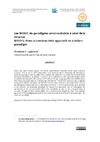Please use this identifier to cite or link to this item:
https://accedacris.ulpgc.es/jspui/handle/10553/70338
| Title: | Les MOOC: du paradigme constructiviste à celui de la reliance | Other Titles: | MOOCs: From a constructivist approach to a reliant paradigm | Authors: | Gérard Lojacono, Florence | UNESCO Clasification: | 570107 Lengua y literatura 550510 Filología |
Keywords: | Constructivisme Connectivisme Complexité Paradigme MOOC, et al |
Issue Date: | 2016 | Journal: | LFE. Revista de Lenguas para Fines Específicos | Abstract: | Les MOOC (Massive Online Open Courses) ont déjà fait couler beaucoup d’encre et cet article
ne vise pas à faire le panégyrique des TICE (Technologies de l’Information et de la
Communication appliquées à l’Enseignement). Il s’agit plutôt de prendre appui sur ces
modalités éducatives émergentes afin de réfléchir sur le bien-fondé des critères scientifiques
de la recherche en sciences de l’éducation, spécialement en FLE (Français Langue Étrangère).
On montrera tout d’abord que bien des concepts actuellement présentés comme à la pointe
de l’innovation pédagogique ont déjà été pensés il y a bien des années et que c’est
uniquement grâce à un contexte social et technologique favorable que l’éducation 2.0 a pu
voir le jour. Ce premier point invite à repenser le constructivisme, paradigme dominant en
sciences de l’éducation, et à poser la question de sa pertinence dans le cadre actuel de la
société de la connaissance. En effet, les caractéristiques de la pensée complexe telle que la
décrit Edgar Morin permettent une prise en compte plus complète et donc plus réelle de
l’équation pédagogique et annoncent la possibilité d’un nouveau paradigme, le paradigme de
la reliance. Much has been written about the MOOC phenomenon (Massive Online Open Courses), however, this is not an ICTE (Information and Communications Technology for Educational purposes) panegyric that we offer here. Instead, the objective is to make the most of these emergent educational modalities in order to start a reflection on the value of scientific criteria in educational research with a focus on French as Foreign Language (FFL). We will first show that many concepts seen as cutting edge educational innovations were actually imagined many years before. Therefore, we will see that it is only thanks to a favorable historical and technological context that the 2.0 education was born. This first point invites us to re-think constructivism, the dominant paradigm for research in education, and to investigate the pertinence of this central model within the knowledge society. In fact, characteristics of complex thought, as described by Edgar Morin, allow a more integrative, thus more realistic approach of the pedagogical equation and announce the possibility of a new paradigm: the “reliance” paradigm. |
URI: | https://accedacris.ulpgc.es/handle/10553/70338 | ISSN: | 1133-1127 | DOI: | 10.20420/rlfe.2016.0088 | Source: | LFE. Revista de lenguas para fines específicos [eISSN 2340-8561], v. 22 (1), p. 12-30 |
| Appears in Collections: | Artículos |
WEB OF SCIENCETM
Citations
1
checked on Jan 25, 2026
Page view(s)
50
checked on Jan 11, 2026
Download(s)
61
checked on Jan 11, 2026
Google ScholarTM
Check
Altmetric
Share
Export metadata
Items in accedaCRIS are protected by copyright, with all rights reserved, unless otherwise indicated.
